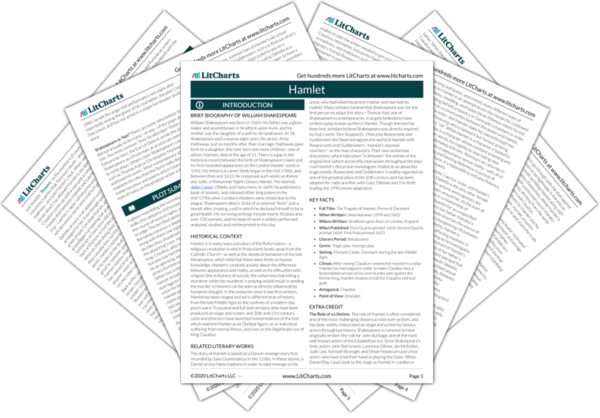Though there are only two traditionally female characters in Hamlet—Ophelia and Gertrude—the play itself speaks volumes about the uniquely painful, difficult struggles and unfair fates women have suffered throughout history. Written in the first years of the 17th century, when women were forbidden even from appearing onstage, and set in the Middle Ages, Hamlet exposes the prejudices and disadvantages which narrowed or blocked off the choices available to women–even women of noble birth. Hamlet is obsessive about the women in his life, but at the same time expresses contempt and ridicule for their actions—actions which are, Shakespeare ultimately argues, things they’re forced to do just to survive in a cruel, hostile, misogynistic world.
Gertrude and Ophelia are two of Hamlet’s most misunderstood—and underdeveloped—characters. Hamlet himself rails against each of them separately, for very different reasons, in misogynistic rants which accuse women of being sly seductresses, pretenders, and lustful schemers. What Hamlet does not see—and what men of his social standing and his time period perhaps could not see if they tried—is that Gertrude and Ophelia are products of their environment, forced to make difficult and even lethal decisions in an attempt to survive and stay afloat in a politically dangerous world built for men, not for women. When Gertrude’s husband, King Hamlet, dies, she quickly remarries his brother, Claudius—who actually murdered him. There are two possibilities: the first is that Gertrude knew about the murder, and the second is that she didn’t. The text suggests that while Gertrude was likely not directly involved in the murder, she was aware of the truth about Claudius all along—and chose to marry him anyway. While Hamlet accuses his mother of lusting after her own brother-in-law, killing her husband, and reveling in her corrupted marriage bed with her new spouse, he fails to see that perhaps Gertrude married Claudius out of fear of what would happen to her if she didn’t. Gertrude, as a woman, holds no political power of her own—with her husband dead, she might have lost her position at court, been killed by a power-hungry new or foreign king, or forced into another, less appealing marital arrangement. Marrying Claudius was perhaps, for Gertrude, the lesser of several evils—and an effort just to survive.
Ophelia’s trajectory is similar to Gertrude’s, in that she is forced into several decisions and situations which don’t seem to be of her own making, but rather things she must do simply to appease the men around her and retain her social position at court. When Ophelia is drawn into her father Polonius and Claudius’s plot to spy on Hamlet and try to tease the reason behind his madness out of him, she’s essentially used as a pawn in a game between men. Polonius wants to see if Hamlet’s madness is tied to Ophelia, and so asks Ophelia to spurn Hamlet’s advances, return gifts and letters he’s given her in the past, and refuse to see or speak with him anymore to see test his hypothesis. Ophelia does these things—and incurs Hamlet’s wrath and derision. Again, as with his mother, he is unable to see the larger sociopolitical forces steering Ophelia through her own life, and has no sympathy for her uncharacteristic behavior. After the death of her father—at Hamlet’s hands—Ophelia loses her sanity. Spurned by Hamlet, left alone by Laertes (who is off studying in France, pursuing his future while his sister sits at court by herself) and forced to reckon with the death of her father—after Hamlet, her last bastion of sociopolitical protection—she goes mad. Even in the depths of her insanity, she continues singing nursery songs and passing out invisible flowers to those around her, performing the sweet niceties of womanhood that are hardwired into her after years of knowing how she must look and behave in order to win the favor of others—specifically men. Indeed, when Ophelia kills herself, it is perhaps out of a desire to take her fate into her own hands. A woman at court is in a perilous position already—but a madwoman at court, divorced from all agency and seen as an outsider and a liability, is even further endangered. Though Ophelia kills herself, she is perhaps attempting to keep her dignity—and whatever shreds of agency she has left at the end of her life—intact.
Gertrude and Ophelia are subject to paternalistic condescension, sexual objectification, and abuse. They are also subject to the constant psychological and emotional weight of knowing that no matter how dehumanizing and cruel the treatment they must face at court may be, things are even worse for women of lower social standings—and if the two of them don’t keep in line, lose their positions at court and face far worse fates. Gertrude and Ophelia make the decisions they make out of a drive simply to survive—and yet Hamlet never stops to imagine the weighty considerations which lie behind both women’s actions.
Women ThemeTracker

Women Quotes in Hamlet
Seems, madam! Nay, it is; I know not “seems.”
Frailty, thy name is woman!
Thrift, thrift, Horatio! The funeral baked meats
Did coldly furnish forth the marriage tables.
Get thee to a nunnery. Why wouldst thou be a breeder of sinners? I am myself indifferent honest, but yet I could accuse me of such things that it were better my mother had not borne me…
















